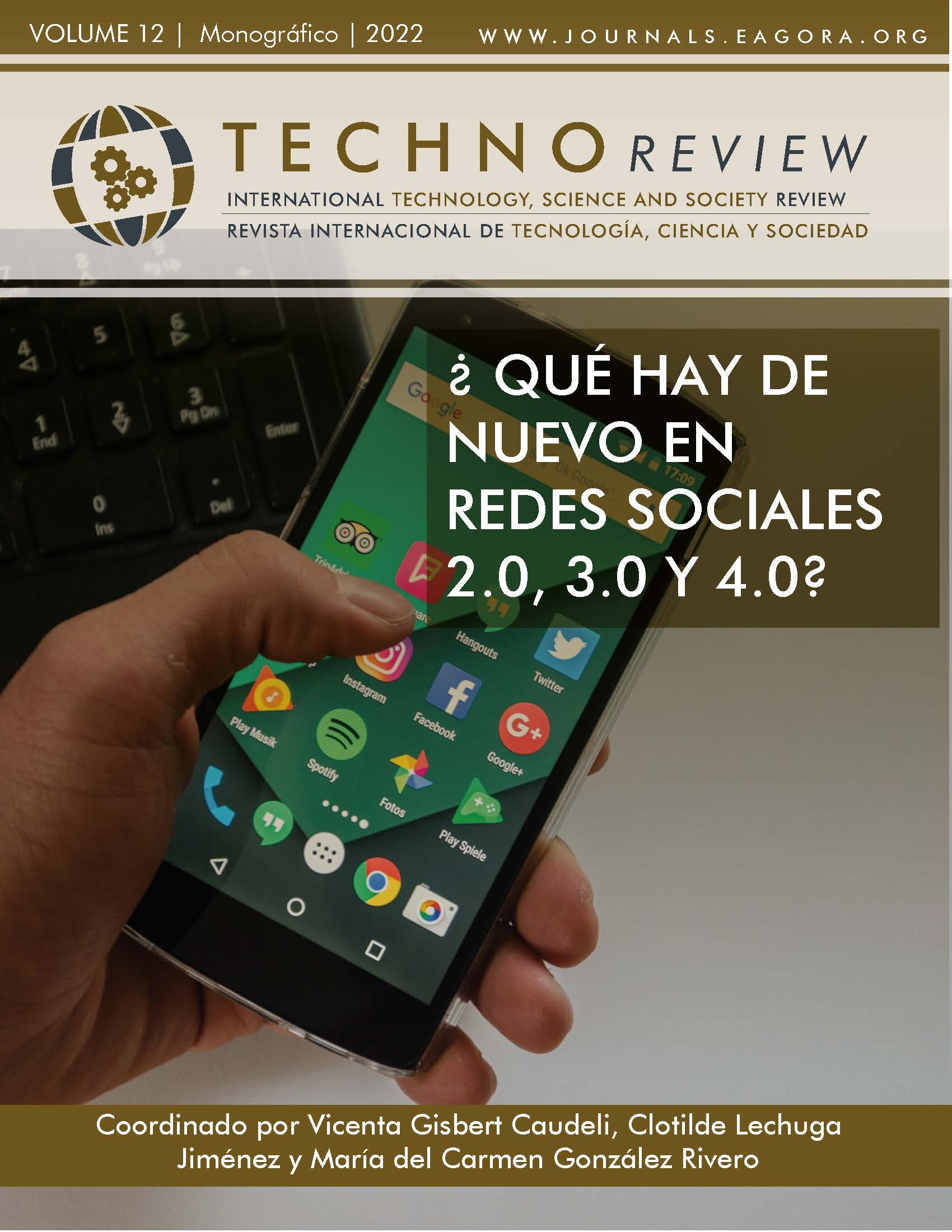Promotional digital marketing strategies with social networks
Bibliometric analysis of digital strategies through Facebook and Instagram
DOI:
https://doi.org/10.37467/revtechno.v11.4393Keywords:
E-marketing, Promotional strategies, Facebook, Instagram, Scopus, WOSviewer, Machine learningAbstract
Promotional strategies have an increasing impact on sales, being strongly transformed with the debelopment of social networks. This study is to provide a bibliometric analysis of promotional marketing strategies highlighting the new associated social networks.
It is made on a selection of Scopus articles (with VOSviewer, words: marketing, promotion, Facebook or Instagram) obtaining 271 publications (2008 to 2022).
A strategy shift towards data mining and machine learning is detected in Instagram. This study concludes with insights that can help managers to drive marketing strategies in their companies.
References
Arora, A., Bansal, S., Kandpal, C., Aswani, R., & Dwivedi, Y. (2019). Measuring social media influencer index-insights from Facebook, Twitter and Instagram. Journal of retailing and consumer services, 49, 86-101. https:// doi.org/10.1016/j.jretconser.2019.03.012
Baker, H. K., Kumar, S., & Pandey, N. (2021). Forty years of the Journal of Futures Markets: A bibliometric overview.
Journal of Futures Markets. Available at https://doi.org/10.1002/fut.22211 (in press).
Baker, H. K., Pandey, N., Kumar, S., & Haldar, A. (2020a). A bibliometric analysis of board diversity: Current status, development, and future research directions. Journal of Business Research, 108(January), 232–246.
Bernhardt, J.M., Alber, J., & Gold, R. S. (2014). A social media primer for professionals: digital dos and don’ts.
Health promotion practice, 15(2), 168-172. https://doi.org/10.1177/1524839913517235
Correia, P. A. P., Medina, I. G., Romo, Z. F. G., & Contreras-Espinosa, R. S. (2014). The importance of Facebook as an online social networking tool for companies. International Journal of Accounting & Information Management. https://doi.org/10.1108/IJAIM-08-2013-0050
Donthu, N., Kumar, S., Mukherjee, D., Pandey, N., & Lim, W. M. (2021). How to conduct a bibliometric analysis: An overview and guidelines. Journal of Business Research, 133, 285-296. https://doi.org/10.1016/j. jbusres.2021.04.070
Ellegaard, O., & Wallin, J. (2015). The bibliometric analysis of scholarly production: How great is the impact?
Scientometrics, 105(3), 1809–1831. https://doi.org/10.1007/s11192-015-1645-z
Grant, M. J., & Boot, A. (2009). A typology of reviews: An analysis of 14 review types and associated methodologies. Health Information and Libraries Journal, 26(2), 91–108. https:// doi.org/10.1111/j.1471- 1842.2009.00848.x
Goh, K. Y., Heng, C. S., & Lin, Z. (2013). Social media brand community and consumer behavior: Quantifying the relative impact of user-and marketer-generated content. Information systems research, 24(1), 88-107. https://doi.org/10.1287/isre.1120.0469
Haddaway, N. R., Pritchard, C. C. y McGuinness, L. A. (2021). PRISMA2020: paquete R y ShinyApp para producir diagramas de flujo compatibles con PRISMA 2020 (Versión 0.0.2). Zenodo. Recuperado de https:// estech.shinyapps.io/prisma_flowdiagram /
Hernández-González, V., Sans-Rosell, N., Jové-Deltell, M. C., & Reverter-Masia, J. (2016). Comparison between Web of Science and Scopus, Bibliometric Study of Anatomy and Morphology Journals/Comparacion entre Web of Science y Scopus, Estudio Bibliometrico de las Revistas de Anatomia y Morfologia. International Journal of Morphology, 34(4), 1369-1378. https://bit.ly/3yVGD1E
Holmberg, C., Chaplin, J. E., Hillman, T., & Berg, C. (2016). Adolescents’ presentation of food in social media: An explorative study. Appetite, 99, 121-129. https://doi.org/10.1016/j.appet.2016.01.009
Iglesias-Sánchez, P. P., Correia, M. B., Jambrino-Maldonado, C., & de las Heras-Pedrosa, C. (2020). Instagram as a co-creation space for tourist destination image-building: Algarve and Costa del Sol case studies. Sustainability, 12(7), 2793. https://doi.org/10.3390/su12072793
Kang, J., Tang, L. R., & Fiore, A. M. (2015). Restaurant brand pages on Facebook: Do active member participation and monetary sales promotions matter?. International Journal of Contemporary Hospitality Management. https://doi.org/ 10.1108/IJCHM-02-2014-0075
Kaplan, A. M. (2012). If you love something, let it go mobile: Mobile marketing and mobile social media 4x4. Business horizons, 55(2), 129-139. https://doi.org/10.1016/j.bushor.2011.10.009
Kite, J., Foley, B. C., Grunseit, A. C., & Freeman, B. (2016). Please like me: Facebook and public health communication.
PloS one, 11(9), e0162765. https://doi.og/10.1371/journal.pone.0162765
Lee, D., Hosanagar, K., & Nair, H. S. (2018). Advertising content and consumer engagement on social media: Evidence from Facebook. Management Science, 64(11), https://doi.org/10.1287/mnsc.2017.2902
Leung, X. Y., Bai, B., & Erdem, M. (2017). Hotel social media marketing: a study on message strategy and its effectiveness. Journal of Hospitality and Tourism Technology. https://doi.org/10.1108/JHTT-02-2017- 0012
Moreno, M. A., & Whitehill, J.M. (2014). Influence of social media on alcohol use in adolescents and young adults. Alcohol research: current reviews, 36(1), 91.
Parveen, F., Jaafar, N. I., & Ainin, S. (2015). Social media usage and organizational performance: Reflections of Malaysian social media managers. Telematics and informatics, 32(1), 67-78. https://doi.og/10.1016/j. tele.2014.03.001
Rohm, A., Kaltcheva, V. D., & Milne, G. R. (2013). A mixed-method approach to examining brand-consumer interactions driven by social media. Journal of Research in Interactive Marketing. https://doi. org/10.1108/JRIM-01-2013-0009
Saravanakumar, M., & SuganthaLakshmi, T. (2012). Social media marketing. Life science journal, 9(4), 4444-4451. https://bit.ly/3IRpw5L
Selçuk, A. A. (2019). Una guía para revisiones sistemáticas: PRISMA. Archivos turcos de otorrinolaringología, 57(1), 57. Recuperado de https://www.ncbi.nlm.nih.gov/pmc/articles/PMC6461330/
Shepherd, T. (2013). Gendering the commodity audience in social media. In The Routledge companion to media & gender (pp. 175-185). Routledge.
Stallworth, B. (2010). Future imperfect: Googling for principles in online behavioral advertising. EDF. Comm. LJ, 62, 465.
Taylor, D. G., & Strutton, D. (2016). Does Facebook usage lead to conspicuous consumption? The role of envy, narcissism and self-promotion. Journal of Research in Interactive Marketing. https://doi.org/10.1108/ JRIM-01-2015-0009
Torres-Salinas, D., & Jiménez-Contreras, E. (2010). Introduction and comparative study of the new scientific journals citation indicators in Journal Citation Reports and Scopus. DOI https://doi.org/10.3145/ epi.2010.mar.12
Van Eck, N.J. & Waltman, L. (2010). Software survey: VOSviewer, a computer program for bibliometric mapping.
Scientometrics, 84(2) 523-538.
Widianingrum, N., Mani, L., Farid, A., Mohamed, T. M., Molina, D., De-La-Hoz, A., ... & Jazzar, M. (2021). The antecedents of purchasing decision of cosmetic products of lizzie parra beauty in social media. Journal of Theoretical and Applied Information Technology, 99(11). https://bit.ly/3v3td2e
Xie, K., & Lee, Y. J. (2015). Social media and brand purchase: Quantifying the effects of exposures to earned and owned social media activities in a two-stage decision making model. Journal of Management Information Systems, 32(2), 204-238. https://doi.org/10.1080/07421222.2015.1063297

